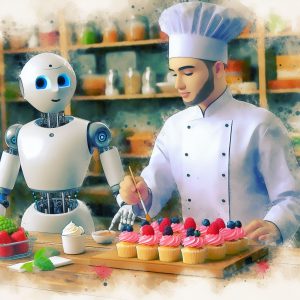Introduction:
The surge of artificial intelligence (AI) in healthcare has brought about a transformative era in the field of dietetics and personalized nutrition. With its advanced algorithms and data analytics capabilities, AI holds immense potential to revolutionize the way dietitians assess, diagnose, and manage dietary needs. This blog explores how AI will fundamentally change the landscape of dietetics and personalized nutrition, empowering dietitians to deliver enhanced and tailored care to their clients.
1. Personalized Nutrition Plans:
AI-driven personalized nutrition plans are changing the one-size-fits-all approach to dietary recommendations. Machine learning algorithms analyze vast datasets, including an individual’s genetic information, lifestyle, medical history, and dietary preferences, to create customized nutrition plans. These AI-generated plans consider individual variations and needs, optimizing nutritional strategies for weight management, disease prevention, and overall wellness.
2. Nutrition Assessment and Diagnosis:
AI algorithms can analyze nutritional data, such as food diaries, nutrient intake records, and lab results, to provide accurate and timely assessments of individuals’ nutritional status. By identifying nutritional deficiencies and imbalances, AI assists dietitians in diagnosing various conditions related to malnutrition, helping individuals receive appropriate interventions early on.
3. Dietary Intervention Recommendations:
AI can generate evidence-based dietary recommendations tailored to each individual’s unique needs. By analyzing large volumes of scientific literature and clinical trials, AI algorithms suggest dietary interventions that effectively address specific health conditions or goals. The recommendations can include adjustments to macronutrient ratios, micronutrient intake, meal frequency, and food choices, ensuring optimal nutritional outcomes.
4. Behavioral Change Support:
Promoting long-term dietary changes requires addressing behavioral factors that influence food choices. AI-powered virtual assistants and chatbots can provide personalized guidance, support, and motivation to help individuals adopt healthier eating habits. These AI tools can track progress, offer feedback, and deliver behavior-change interventions tailored to the individual’s needs and preferences.
5. Disease Management and Prevention:
AI has shown promise in supporting dietitians in managing and preventing chronic diseases such as obesity, diabetes, and cardiovascular diseases. AI algorithms can predict disease risk based on an individual’s health profile and dietary patterns, enabling dietitians to intervene early and create preventive nutrition strategies. Additionally, AI can monitor treatment effectiveness and adjust dietary plans accordingly, optimizing disease management outcomes.
6. Data-Driven Research and Evidence-Based Practice:
The integration of AI in dietetics opens up new avenues for data-driven research. AI algorithms can analyze vast datasets, including electronic health records, dietary databases, and genetic information, to identify trends, patterns, and associations related to dietary factors and health outcomes. These insights contribute to the development of evidence-based guidelines and best practices in the field of dietetics.
Artificial intelligence is revolutionizing the field of dietetics and personalized nutrition, bringing about a paradigm shift in the way dietitians deliver care. With its ability to analyze data, personalize nutrition plans, and provide real-time support, AI empowers dietitians to offer more precise, effective, and tailored interventions to their clients. As AI technology continues to advance, it is poised to transform dietetics into a truly personalized and data-driven field, ultimately improving the health and well-being of individuals worldwide.
The food industry is undergoing a significant transformation, and the role of dietitians is being reshaped by technological advancements. AI (Artificial Intelligence) is emerging as a potential game-changer, introducing both risks and opportunities for dietitians. Let’s explore the dangers posed by AI, the possibilities of job replacement, how AI can assist in dietary practices, and strategies for dietitians to adapt to this changing landscape.
Dangers of AI in the Food Industry for Dietitians:
- Automation and Job Displacement: As AI technologies become more sophisticated, there is a concern that routine tasks currently handled by dietitians, such as data analysis and dietary assessment, could be automated. This raises the possibility that some dietitians’ jobs may be replaced by AI systems.
- Misinformation and Unreliable Advice: With AI becoming increasingly accessible, there is a risk that non-credentialed individuals or companies may develop AI-based dietary tools and advice that lack scientific rigor. This can lead to the spread of inaccurate information, potentially jeopardizing the health and well-being of individuals seeking dietary guidance.
- Limited Empathy and Personalized Care: AI systems, by their nature, lack the ability to replicate the empathetic and personalized care that human dietitians provide. This can hinder the development of strong patient-dietitian relationships, which are crucial for effective dietary interventions and long-term behavior change.
Possibilities of AI Integration in Dietitian Jobs:
- Enhanced Data Analysis and Insights: AI can be a powerful tool for analyzing vast amounts of dietary data, identifying trends, and providing dietitians with valuable insights. This can help dietitians make more informed decisions, improving the accuracy and effectiveness of dietary recommendations.
- Personalized Nutrition Plans: AI algorithms can be trained on individual dietary preferences, health conditions, and lifestyle factors to generate personalized nutrition plans tailored to each client’s unique needs. This can lead to more targeted and effective dietary interventions.
- Automated Tracking and Monitoring: AI-powered apps can track dietary intake, physical activity, and other relevant health metrics. This can greatly assist dietitians in monitoring client progress, identifying areas for improvement, and providing timely feedback.
- Virtual Consultations and Remote Care: AI-enabled virtual consultations can extend dietitians’ reach and enable them to provide remote care to clients in geographically dispersed areas or with mobility limitations.
How AI can Aid Dietitians in Their Work:
- Facilitate Research and Evidence-Based Practice: AI can assist in analyzing large datasets, uncovering patterns, and identifying potential correlations between dietary patterns and health outcomes. This can contribute to a growing body of evidence-based research, informing dietary guidelines and recommendations.
- Enhance Client Engagement and Education: Interactive AI-driven platforms can provide engaging and educational resources to clients, helping them better understand the rationale behind dietary recommendations and promoting long-term adherence to healthier eating habits.
- Improve Efficiency and Workflow: AI-powered tools can streamline administrative tasks, appointment scheduling, and data entry, allowing dietitians to focus more time on providing high-quality care to their clients.
Strategies for Dietitians to Adapt to the Changing Landscape:
- Embrace Continuous Learning: Dietitians need to stay abreast of AI developments, including new technologies, applications, and research findings. Attending workshops, taking online courses, and networking with tech-savvy colleagues can help enhance their knowledge and skills.
- Develop AI-Complementary Skills: Dietitians should focus on developing skills that complement AI, such as critical thinking, emotional intelligence, empathy, and personalized care. These skills will remain essential in providing comprehensive dietary guidance and fostering meaningful patient-dietitian relationships.
- Collaborate with Tech Professionals: Dietitians can collaborate with data scientists, software engineers, and other tech experts to develop innovative AI-powered tools and resources that address specific needs within the food industry and healthcare.
Conclusion:
The integration of AI into the food industry presents both challenges and opportunities for dietitians. While AI has the potential to automate certain tasks and potentially displace some jobs, it also offers valuable tools for enhancing data analysis, personalizing nutrition plans, and extending care to a broader population. Dietitians who embrace continuous learning, develop AI-complementary skills, and collaborate with tech professionals will be well-positioned to adapt to this changing landscape and continue to play a vital role in promoting healthy eating and improving overall well-being in the food industry.



